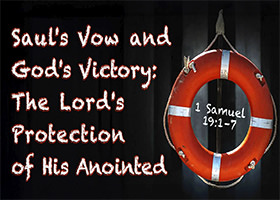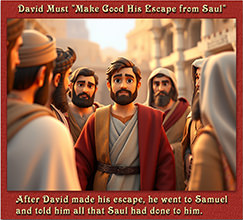1 Samuel 19:1–24 . . . Bible Study Summary with Videos and Questions
“Saul Tries to Kill David”
We covered in our summary of chapter 18) how Saul was absolutely right about David being the one who'd become the king of Israel in his place. But he was wrong to distrust David, thinking that he sought to unseat him from his throne. Jealousy seized and completely overtook Saul. So he attempted to kill David with a spear as he played the harp/lyre for him in his house. From that time forward, Saul set out to bring about David’s death. At first, he indirectly encouraged David to go to war with Israel’s enemies, hoping that David would be killed in battle. Saul even offered his daughters to become a wife for David, if he'd show himself courageously in battle. However, instead of dying in battle, David racked up one success after another, becoming even more popular with the people. Saul’s plan had backfired. When David killed 200 Philistines as a dowry gift, Saul had to give him Michal, his daughter, in marriage. Saul’s fears multiplied.
In today's passage, Saul finally decided that he must take the direct approach. He ordered his servants to kill David (v. 1). We'll see that Jonathan cared greatly for his friend David; he warned him that his father wanted to kill him. He also spoke with his father and temporarily persuaded him that David was a faithful servant. Saul vowed not to harm David, but that vow lasted only until David went to war again and had great success again. Saul’s jealousy, fueled by an evil spirit, prompted him to attempt to put David to death for a second time, using his spear.
When that attempt failed, Saul sent his servants to David’s house to seize him and put him to death. But with Michal’s help, David was able to escape and flee to Samuel and tell him all that had happened. Saul learned that David and Samuel joined forces at Ramah so he dispatched an armed squad to capture David. But each time a squad arrived, they would prophesy. [Who, under the control of God’s Spirit, could seize God’s anointed?] Finally, after unsuccessfully sending armed messengers for a third time, Saul went himself, only to be overcome by the Spirit and prophesy himself (vv. 23–24).
[Note: Click the link to This Week’s Passage near the bottom of this page to read today’s Scripture.]
Jonathan Attempts to Protect David from Saul (19:1–7)
Saul felt that he needed to abandon his pretense that we saw him use in 18:22: Then Saul ordered his attendants: “Speak to David privately and say, ‘Look, the king likes you, and his attendants all love you; now become his son-in-law.’” So he ordered Jonathan and his soldiers to put David to death, which we'll see in v. 11. He became more committed to this purpose to murder David. He felt driven to take more desperate measures.
Saul Tries to Kill David
19 1Saul told his son Jonathan and all the attendants to kill David. But Jonathan had taken a great liking to David 2and warned him, “My father Saul is looking for a chance to kill you. Be on your guard tomorrow morning; go into hiding and stay there. 3I will go out and stand with my father in the field where you are. I’ll speak to him about you and will tell you what I find out.”
4Jonathan spoke well of David to Saul his father and said to him, “Let not the king do wrong to his servant David; he has not wronged you, and what he has done has benefited you greatly. 5He took his life in his hands when he killed the Philistine. The Lord won a great victory for all Israel, and you saw it and were glad. Why then would you do wrong to an innocent man like David by killing him for no reason?”
6Saul listened to Jonathan and took this oath: “As surely as the Lord lives, David will not be put to death.”
7So Jonathan called David and told him the whole conversation. He brought him to Saul, and David was with Saul as before (1 Sam. 19:1–7).
Saul's overt actions created a conflict of loyalties for Jonathan: He needed to honor his father and king, but who also loved David (cf. 18:1, 3). He chose to tell David what Saul's intentions were, but he also tried to honor his father by urging him not to kill David. He appealed to Saul logically and rationally. He reminded Saul that he was the king and that David was his servant, that he needed to be fair with David, and that it was in Saul's best interest to let David live (v. 4). He also reminded Saul that David was the Lord's instrument who'd defeated Israel's enemies and that Saul had rejoiced in David's successes. Moreover he appealed for justice since David's death would have been unwarranted (v. 5).
At least temporarily, Jonathan's appeal was successful. It resulted in Saul solemnly vowing not to kill David (v. 6), however, we'll see in the next part of our text that he'll break that short-lived vow (v. 10). His appeal to his dad resulted in David's restoration to the court and his continuing ministry to the king (v. 7).
As David Succeeds, Saul Gets More Jealous of Him (vv. 8–10)
Three verses record Saul's fourth attempt to kill David. The text emphasizes how thoroughly Saul wanted to do away with his rival. Clearly, those who desired the best for God love David, but those who desired the best for themselves hated him.
Verse 9 reminds readers of an evil spirit's prevalence in Saul's life. It’s the third reference to an evil spirit afflicting Saul (cf. 16:14; 18:10). This evil influence overcame Saul's good intentions; it resulted in his breaking the vow he'd personally made to God's name (v. 6). As a result, David had to “make good his escape.” This phrase occurs three times in this chapter (vv. 10, 12, 18). From that point on, David would no longer be able to be in Saul's presence; he had to flee and escape, seeking refuge from the king, wherever he could find it. David's days as a fugitive (living beyond the king's reach), which began here, will continue until Saul dies.
Today, we see that David's experience is typical of those of us who choose to commit ourselves to following God faithfully. Because he blesses us and makes us a blessing to others, many people appreciate what God is in our lives. However, those who seek blessings for themselves and aren't willing to do what's necessary to receive such blessings, despise them.
Michal Also Attempts to Protect David from Saul (vv. 11–17)
11Saul sent men to David’s house to watch it and to kill him in the morning. But Michal, David’s wife, warned him, “If you don’t run for your life tonight, tomorrow you’ll be killed.” 12So Michal let David down through a window, and he fled and escaped. 13Then Michal took an idol and laid it on the bed, covering it with a garment and putting some goats’ hair at the head.
14When Saul sent the men to capture David, Michal said, “He is ill.”
15Then Saul sent the men back to see David and told them, “Bring him up to me in his bed so that I may kill him.” 16But when the men entered, there was the idol in the bed, and at the head was some goats’ hair.
17Saul said to Michal, “Why did you deceive me like this and send my enemy away so that he escaped?” (1 Sam. 19:11–17).
Once again we'll see God's plan to preserve the life of his anointed servant David. In both cases it was one of Saul's own children who came to David's rescue. Jonathan protected David at the beginning of this section (vv. 1–5); now, in the next seven verses, Michal did similarly (vv. 11–17). This time, Saul reactivated his mission of putting David to death by using his men (v. 1). As Jonathan had done (v. 2), Michal told David what Saul was planning (v. 11). Then she aided his escape, first by helping him flee through an open window, and subsequently fashioning a dummy in his bed by putting an idol under the covers while later concocting a story that he'd become ill and was sick in bed. She intended the guise of his image to convince Saul's servants that David was seriously ill and shouldn't be disturbed.
Michal's deceptive scheme was intended to provide David enough time to escape his potential killers. Her thoughtful effort of using a handy household idol portrays her as a woman who hadn't yet shared David's devotion to God's values. Was the household idol (Heb. teraphim) that she put under the covers hers or David's? The text doesn't say so we have to wonder.
We should expect that Saul expected more loyalty from his daughter than he received. Jonathan had described David as Saul's servant (v. 4), but Saul now called him his enemy (v. 17). Michal seems to have considered her deceptive fib justifiable (cf. v. 11). Jonathan hadn't lied to Saul (vv. 4–5). Both Jonathan and Michal's words resulted in David's temporary safety, but Jonathan and Michal's characters contrast in what they said to their father and king.
Saul's daughter and son protected David's life. God's care and his short- and long-term plans for David resulted in the breaking of strong familial loyalties. In the ancient world, a daughter's loyalty to her father normally remained strong even following her marriage. In this instance, God overcame what was natural in order to protect his anointed and very faithful servant.
God the Deliverer (vv. 18–24)
It was quite natural for David to seek refuge with the faithful prophet Samuel who resided less than an hour's walk from Saul's headquarters. "Naioth" (lit. "Dwellings") was evidently a compound within Ramah, where Samuel headed a school of prophets. God, here, rescued David, not by a human intermediary but directly by the overpowering influence of God's Spirit. Prophesying involved praising the Lord. These next five verses highlight the people of prophesy in Ramah.
18When David had fled and made his escape, he went to Samuel at Ramah and told him all that Saul had done to him. Then he and Samuel went to Naioth and stayed there. 19Word came to Saul: “David is in Naioth at Ramah”; 20so he sent men to capture him. But when they saw a group of prophets prophesying, with Samuel standing there as their leader, the Spirit of God came on Saul’s men, and they also prophesied. 21Saul was told about it, and he sent more men, and they prophesied too. Saul sent men a third time, and they also prophesied. 22Finally, he himself left for Ramah and went to the great cistern at Seku. And he asked, “Where are Samuel and David?”
“Over in Naioth at Ramah,” they said.
23So Saul went to Naioth at Ramah. But the Spirit of God came even on him, and he walked along prophesying until he came to Naioth. 24He stripped off his garments, and he too prophesied in Samuel’s presence. He lay naked all that day and all that night. This is why people say, “Is Saul also among the prophets?” (1 Sam. 19:18–24)
Rather surprisingly to most first-time readers of "Samuel," Saul's three groups of messengers, and even the king himself, ended up serving God, rather than opposing him, through their Spirit-filled act of prophesying. The Spirit's powerful equipping overrode the king's authority. The reference to his prophesying (vv. 23–24), which happened near where he prophesied shortly after his anointing (10:12), became an ironic comment on Saul's life story. He'd begun his reign with great potential and with God's enabling Spirit, which resulted in his praising God; now he was becoming a madman.
This passage doesn't support the theory that prophets became ecstatic when they prophesied. Saul's disrobing (v. 24) probably symbolized the loss of his regal dignity and status, as well as his personal dignity. Saul drove himself to the brink of insanity by refusing to submit to God, the most powerful entity who still exercised sovereign control over him, despite the king's attempts to choose his own way.
It's significant that this chapter closes with the repetition of the question, "Is Saul also among the prophets?" This derogatory saying brackets the story of Saul's contacts with Samuel and the Holy Spirit (cf. 10:11). It reminds you that Saul had the potential to be a great king because of Samuel and the Spirit's resources that were available to him. Nevertheless, he lost the opportunity to establish a dynasty, he lost his own throne, and he lost his personal dignity by refusing to act like a prophet; that is, he refused to put the honor, glory, and will of God before his personal ambitions and pride.
This chapter's three instances of David's deliverance document how God preserved his anointed, using both natural and supernatural means to do so. Since God has anointed Christians with his Spirit (1 John 2:20), this record of how God preserves his anointed should be a hearty encouragement to us today and going forward.
† Summary of 1 Samuel 19:1–24
1 Samuel 19:1–24 continues the tension between Saul and David, focusing on Saul’s attempts to kill David and David’s narrow escapes with loyal help. After David’s successes and growing favor, Saul’s jealousy turns into open hostility. Saul first tries to kill David outright, but Jonathan, Saul’s son and David’s close friend, warns David and helps him escape (19:1–7). Jonathan advocates for David before his father, reminding Saul of David’s loyalty and service, and for a time, Saul relents.
However, Saul’s anger soon returns. He sends messengers to watch David’s house and kill him the next morning, but David’s wife, Michal, helps him flee through a window, deceiving the messengers by placing a household idol in the bed to simulate David sleeping (vv. 8–17). David flees to Samuel at Ramah for safety. Saul sends messengers again, but this time, the Spirit of God falls upon them, causing them to prophesy, which repeats when Saul himself goes to capture David and is similarly overcome by the Spirit and prophesies (vv. 18–24). This chapter highlights God’s protection over David, the loyalty of Jonathan and Michal, and the spiritual power that interrupts Saul’s murderous designs.
Key points with verse references:
• Saul attempts to kill David, but Jonathan warns David and mediates with Saul for a temporary reprieve (vv. 1–7).
• Saul sends messengers to watch David’s house and kill him, but Michal helps David escape by deceiving the assassins with a household idol (vv. 8–17).
• David flees to Samuel at Ramah, seeking refuge from Saul’s wrath (v. 18).
• Saul’s messengers are overcome by the Spirit of God, causing them to prophesy instead of capturing David (vv. 18–22).
• Saul himself is overtaken by the Spirit and prophesies, unable to capture David, demonstrating God’s sovereign protection (vv. 23–24).
This Week's Passage
1 Samuel 19:1–24
New International Version (NIV) [View it in a different version by clicking here; also listen to chapter 19 narrated by Max McLean].
† Summary Video: “The First Book of Samuel”
† Watch this introductory video clip created by BibleProject on bibleproject.com.
- Q. 1 Would you have trusted Saul's vow that he made in vv. 6–7? . . . Why did David?
- Q. 2 The "prophesying" done in vv. 20–24 seems to have prevented Saul's men from capturing David. Why would God have used such protective prophesying?
- Q. 3 How might Saul's prophesying have been a sign of God's mercy toward Saul?





